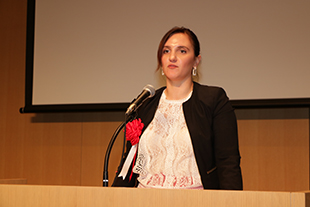 The 18th Asia Pacific Research Prize (Iue Prize) winner: Dr. Aleksandra Babovic
The 18th Asia Pacific Research Prize (Iue Prize) winner: Dr. Aleksandra Babovic
Title of Dissertation: “Justice on Trial: The International Military Tribunal for the Far East Reevaluated, 1945-1956”

- Dr. Aleksandra Babovic
-
- Career -
Aleksandra Babovic is an Assistant Professor at the Osaka University Graduate School of Human Sciences, Japan where she teaches topics related to international politics, diplomacy, law and Japan. She holds a PhD from the Kobe University Graduate School of Law with a specialization in Diplomatic History. She earned her MA degree from the Paris School of International Affairs, Sciences Po (France). During her doctoral studies she worked as a part-time lecturer at Kyoto University of Foreign Studies (Japan) and Osaka University (Japan). Her research interests include Japanese post-war history, international criminal law and justice, international politics and diplomacy.
- Summary -
The International Military Tribunal for the Far East (furthermore the Tokyo Tribunal) has remained an important and timely topic in relation to Japanese responsibility in the Pacific War and its historical narrative. The present research discusses the Allied Powers’ motifs and reasons behind the establishing the Tribunal, the way in which these legalistic policies evolved in face of the intensifying Cold War, in particular by looking at the fate of Class A war criminals, top military and civilian leaders responsible for waging the aggressive war, after the Allied Powers’ occupation ended.The Tokyo Tribunal has been analyzed as a strategic legalism tool that served the Allied Powers to advance their political, strategic, and to a smaller extent, moral goals at international, regional, and Japan level. At the international level, the Tribunal represents an integral part of 1945 international order based on illegality of aggressive war and its criminality, categories that had been previously forged with limited success at the Paris Peace Conference in 1919. At the regional level, both the indictment and the majority judgement of the Tribunal were designed to reflect the hegemonic historical and judicial narrative of the Pacific War in which Japan conspired and unilaterally waged war against the Allied Powers and their colonies in East Asia. The distortion of a more comprehensive historical narrative is furthermore observable when it comes to the choice of international crimes to be included in the indictment which prioritized the crime of aggression at the expense of crimes against humanity and war crimes, predominantly committed against the population of Southeast Asian countries. This resulted in the strategic forgetting of these events not only from the judicial narrative, but also from historical narrative surrounding the Pacific War.
Japan ascendance to the role of Western ally from 1948 and its newly perceived strategic value in the Cold War context did not result in the prompt release of Class A war criminals from Sugamo prison. On the contrary, the process reached a deadlock in which the above-mentioned legalism no longer played a strategic role. This issue exposed the inconsistencies in US expectations regarding Japan’s rearmament and started to inhibit progress on the important security agenda in US-Japan diplomatic relations. The dynamics of US-Japan negotiations regarding Class A war criminals within the broader war criminals agenda, as it will be shown, placed in the hands of Japanese government a powerful tool to instigate its own visions of security vis-à-vis the US. Consequentially, the IMTFE and Class A war criminals which once represented the symbol of Japanese defeat started to become an asset for Japan in its efforts to achieve postwar reintegration. Hence, the justice meted out at IMTFE changed its quality in that from a strategic tool placed in the hands of the victorious allies it became a strategic tool placed in the hands of Japan, the defeated party in war.






